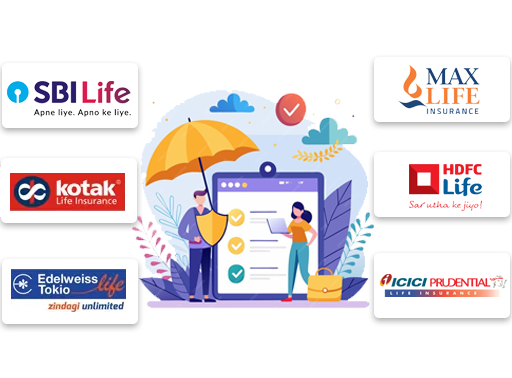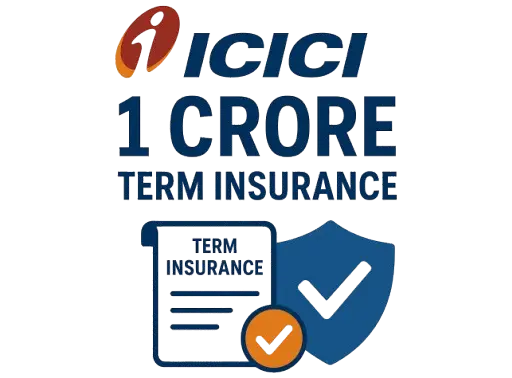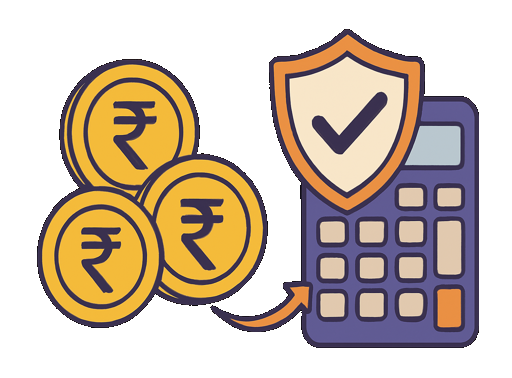- Tax Benefits on Term Insurance
- Explore 80C & 10(10D)
- Protection with Tax Savings

I am a passionate content writer with over three years of experience in the insurance domain. An avid learner, I always tries stays ahead of the industry's trends, ensuring my writing remains fresh and includes the latest insurance shifts. Through my work, I strive to engage with targeted insurance readers.
Reviewed By:

Sharan Gurve has spent over 9 years in the insurance and finance industries to gather end-to-end knowledge in health and term insurance. His in-house skill development programs and interactive workshops have worked wonders in our B2C domain.
Updated on Jul 02, 2025 3 min read
What is Term Insurance Tax Benefit?
You can save on taxes and protect your family's future with term insurance. With a regular term insurance plan, you not only safeguard your loved ones but also enjoy tax benefits for up to 1.5 lacs under section 80 C of the Income Tax Act 1961. It's a smart way to get your life covered and reduce your tax burden.
Types of Tax Benefits Available Under Term Insurance: An Overview
| Specifications | Parameters |
| Section 80C | Up to 1.5 lacs |
| Section 80D (For riders) | Up to 50 thousand |
| Section 10 (10)D | Up to 2.5 lacs |
What are the Different Types of Tax Benefits Available under Term Insurance?
Term insurance offers different tax benefits on different features such as premium payment and sum assured.
Given below are the various tax benefits available under term insurance.
-
On premium payment
Similar to the Public Provident Fund(PPF), tax-saver Fixed Deposits (FDs), National Savings Certificate (NSC) and even repayment of home loan principal, term insurance also offers a tax saving option under Section 80C of the Income Tax department. The policyholder can avail of the deductions of up to INR 1.5 lakh under this section on annual premium payments.
Let us understand in depth:
Mr Sangar, 30 years old, has a term Insurance plan of INR 1 crore for which he pays INR 10,000 premium without GST annually. Through this, Mr Sangar can save the tax of INR 10,000 annually under the 80C section of the IT department.
However, there are certain conditions applied to avail of the benefit on the premium paid, such as:
- The annual premiums paid must not exceed 10% of the sum assured amount. In case, the premiums do exceed 10%, then the deductions will be applied proportionately.
- For policies issued before 31st March, the deduction will be applicable only if the yearly premium does not exceed 20% of the sum assured.
- As per Section 80C(5), in case, a policy is voluntarily surrendered or terminated two years from the beginning of the policy, the policyholder is not eligible to receive Section 80C tax benefits on premium payments.
-
On Sum assured
There are different payouts done in a Term Insurance plan and this nature of the scheme has another crucial role to play in saving tax in all situations.
Firstly, the sum assured amount received as a death benefit is again exempted under Section 10(10D) of the Income Tax Act. This means that when a nominee or beneficiary of the term insurance plan gets the sum assured amount post the demise of the policyholder the person is entitled to get the entire amount promised in the plan without any tax deductions.
Nowadays, there is a huge demand for a Term Insurance Plan with a Return of Premium wherein the policyholder is entitled to get the maturity benefit of the plan in case he/she survives the term insurance plan. In this case, the term insurance payout is entirely tax-free under Section 10(10D) of the Income Tax Act.
Let us understand in depth:
Mr. Sharma has a Term Insurance plan for INR 50 Lakh sum insured. He passed away during the policy tenure and his family is entitled to receive the sum assured amount. So Mr. Sharma’s family will receive the entire amount of INR 50 Lakh without any tax deductions under Section 10(10D) of the Income Tax Act
However, there are some scenarios where the tax is applicable on Term Insurance payout received by the beneficiary, such as -
- Any benefit received under Section 80 DD(3) or sub-section (3) of section 80DDA
- Any benefit received under Keyman Insurance policy. The keyman insurance policy is the one where the proposer, as well as the premium payer, is the employer, the life to be insured is that of the employee and the benefit in case of a claim, goes to the employer.
-
Under section 80D
It is correct that the 80D section primarily permits health insurance and its related exemptions. But, it is still unknown that a policyholder can make effective use of this section in their Term Insurance Plans as well.
There are several health-related riders offered with Term Insurance Plans such as Critical Illness, Surgical Care, Hospital Care Rider, etc that provide the benefit of 80D. Important considerations to know about this tax benefit are:
- Deductions under Section 80D are available for an amount of Rs. 25,000 and not more than this.
- This tax benefit can also be taken for the insurance policy taken for your parents, up to additional deductions of Rs. 25,000.
- For senior citizens' policies, the deduction limit goes up to Rs. 50,000.
-
Under section 10(10D)
Along with the tax advantages granted to term insurance policyholders, there are other tax breaks to be aware of. Section 10 (10D) term insurance tax benefits allow family members to save money through tax exemptions. Section 10(10D) protects death benefits and maturity benefits from taxes. The maturity benefits of all life insurance plans issued on or after April 1st, 2024 are eligible for tax deductions only if the annual premiums paid by an individual are up to INR 5 lakh. According to the union budget proposed by the Government of India, maturity benefits, death benefits, and any cumulative bonus are tax-free if the premiums do not exceed 10% of the sum insured amount.
It is essential to have knowledge of tax exemptions on life insurance plans to make better decisions for the financial safety of your loved ones. However, it is also essential to understand that Section 10(10D) is subject to further changes due to amendments made to the Income Tax Act. Below mentioned are the detailed explanations of how section 10(10D) aids in Term insurance tax exemption.
- Individuals can claim tax exemptions under 10 (10D) if policy premiums paid do not exceed 20% in a single policy year.
- In case of maturity returns the benefit amount should be the death payout.
- This tax exemption is valid for all the returns earned via a Unit linked insurance plan (ULIP) as well.
-
Under Section 80C
The term insurance plan offers tax benefits for up to 1.5 lacs under section 80C of the Income Tax Act 1961, for the premium paid in the same financial year.
Tax Benefits on Term Insurance Riders
Term Insurance Plans offer rider benefits to policyholders. These riders provide supplementary coverage in addition to the basic term insurance plan and also offer term insurance tax benefits. There are multiple rider options attached to a base term insurance plan such as critical illness rider, return of premium, accidental death benefit riders, and more. To understand how they help with tax exemptions
- When you purchase a term insurance plan you can avail tax benefits for Term insurance under 80d on purchasing an additional critical illness rider with your base plan.
- Term insurance tax exemption is provided to insurance holders under section 80 c when opting for riders such as the return of premium at the time of policy purchase.
Still confused about term plan deduction in income tax:
If you are still confused about term plan deduction in income tax then you can reach out to us at PolicyX.com through the below channels. We are IRDAI-certified insurance advisors and will help you to know everything about tax saving.
- For talk to our expert, you can click over the button as below:

- You can also contact us on 1800-4200-269 (Toll-free)
Conclusion
Saving money that goes into the form of tax stands as one of the top-rated reasons when it comes to buying term life insurance and it should be used effectively along with the consideration of other factors such as claim settlement ratio, exclusions and inclusions in a plan, network hospitals and many more. It is equally important to understand the amount of tax one can save in the given premium.
Tax Saving with Term Insurance: Faqs
1. What are various tax benefits available to insurance holders?
Term Insurance plans are eligible for tax benefits such as 80 C and 80D. 80 C offers the policyholder to claim exemptions up to Rs. 1.5 Lakh on the policy premium while 80 D covers critical illness insurance premiums up to an amount of Rs. 25,000. Insurance holders who are senior citizens can claim benefits up to an amount of Rs. 50,000.
2. Who is eligible for Tax Savings for term insurance?
Insurance holders can claim tax benefits on premiums. The tax savings can be done by insurance holders based on these tax deductions set by the government.
3. Can you claim tax benefits once the policy is terminated by the insurance holder?
If an insurance holder decides to terminate their term insurance policy they can no longer avail of tax benefits. An insurance holder can only avail tax benefits till the time they are paying the premiums.
4. What is the maximum amount of deductions an insurance holder can claim under term insurance tax benefit 80D?
The maximum amount of tax deductions availed under benefit 80D is INR 25,000 and INR 50,000 for Senior Citizens.
5. What is Section 10D of the term plan tax benefit?
Section 10D simply means that the death benefit or maturity benefit received from a term insurance policy is tax-free.
6. What are term insurance tax benefits?
All the tax exemptions that are available for term plans to the insurance holders under the Income Tax Act, 1961 laid down by the government of India are the term insurance tax benefits. It can be in the form of sections 80D, 80C, or 10(10D) depending on the insurance plan benefits opted by the insurance holder
7. How can insurance holders gain the most advantage from Term insurance tax exemption?
In order to avail maximum term insurance tax benefits it is essential to gain proper knowledge via research and proper investment in a term plan that is suitable for your needs.
8. Is a term plan eligible for tax benefits under section 80C?
Yes, according to the Income Tax Act,1961 you are eligible for tax exemption on premiums paid towards a term plan policy for up to INR 1.5 Lakh under section 80C.
9. Is the death benefit eligible for Term insurance tax exemption?
Yes, the death benefit is eligible for tax exemptions under section 10(10D) of the Income Tax Act, 1961.
Other Term Insurance Companies
Share your Valuable Feedback
4.6
Rated by 866 customers
Was the Information Helpful?
Select Your Rating
We would like to hear from you
Let us know about your experience or any feedback that might help us serve you better in future.


Written By: Varun Saxena
I am a passionate content writer with over three years of experience in the insurance domain. An avid learner, I always tries stays ahead of the industry's trends, ensuring my writing remains fresh and includes the latest insurance shifts. Through my work, I strive to engage with targeted insurance readers.















4391-1741255269.png)





Do you have any thoughts you’d like to share?